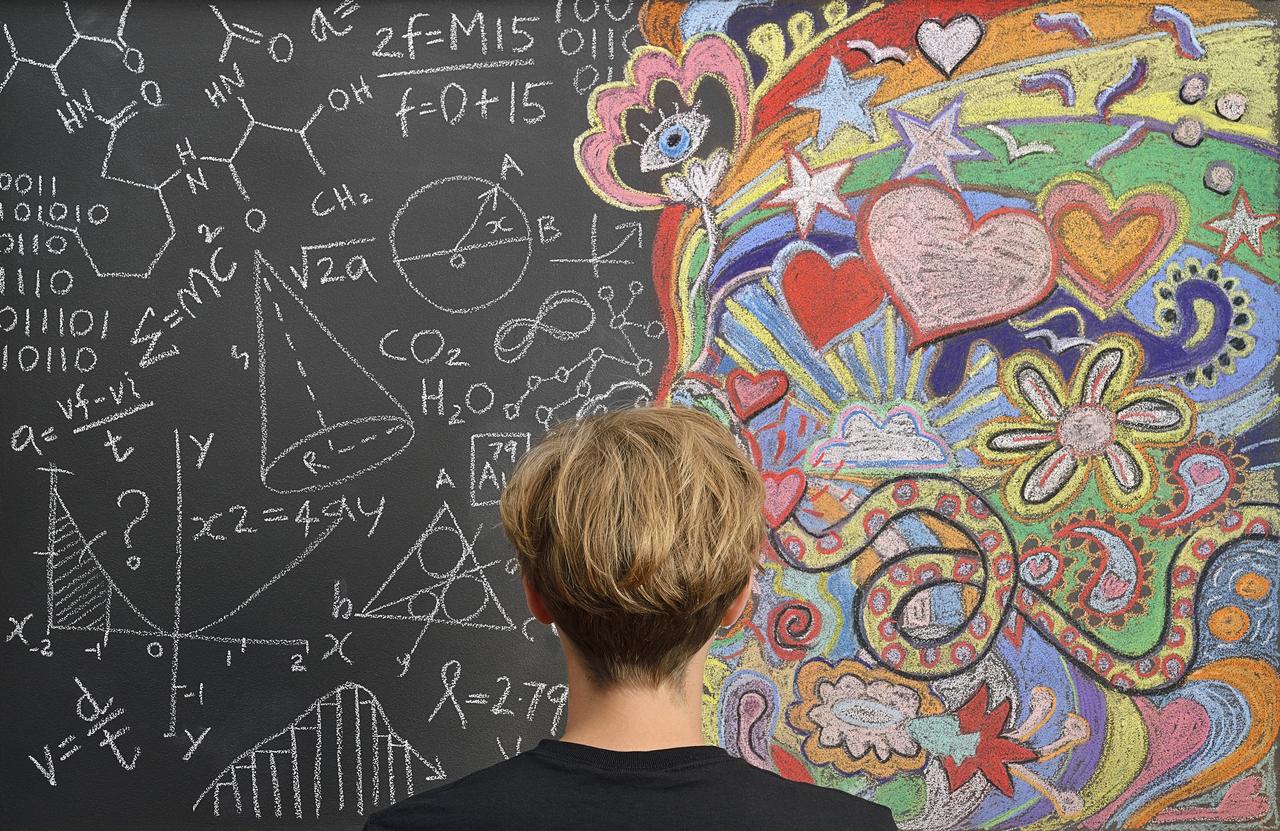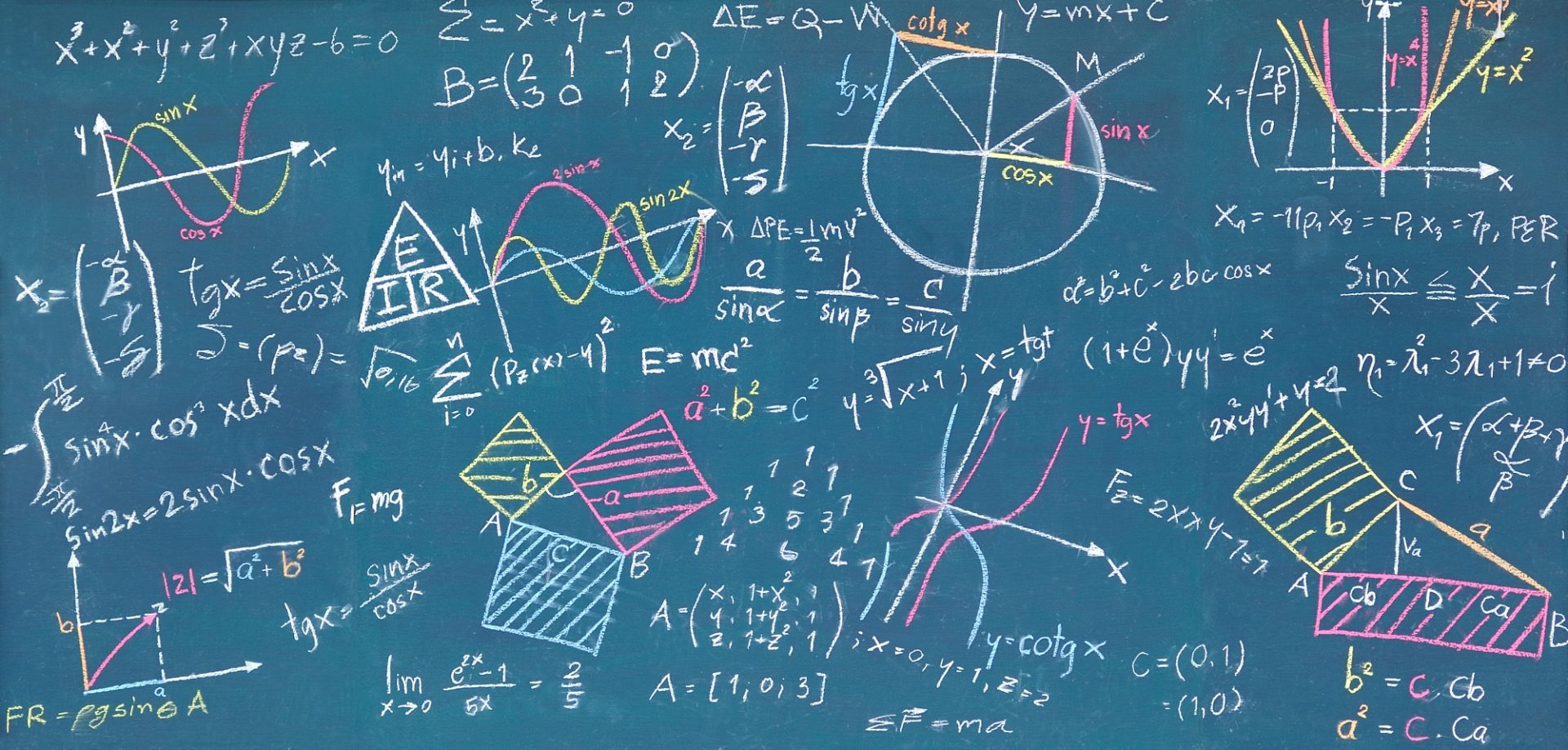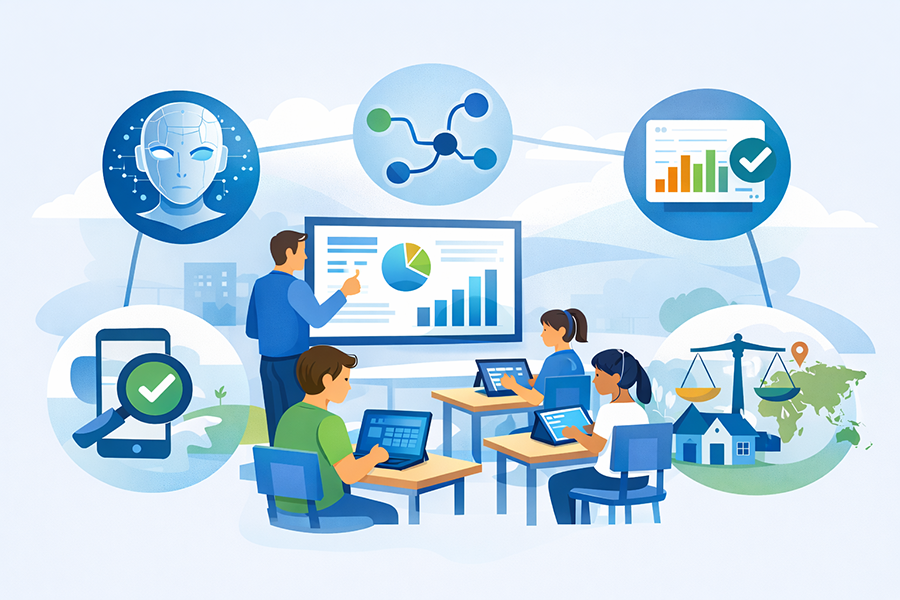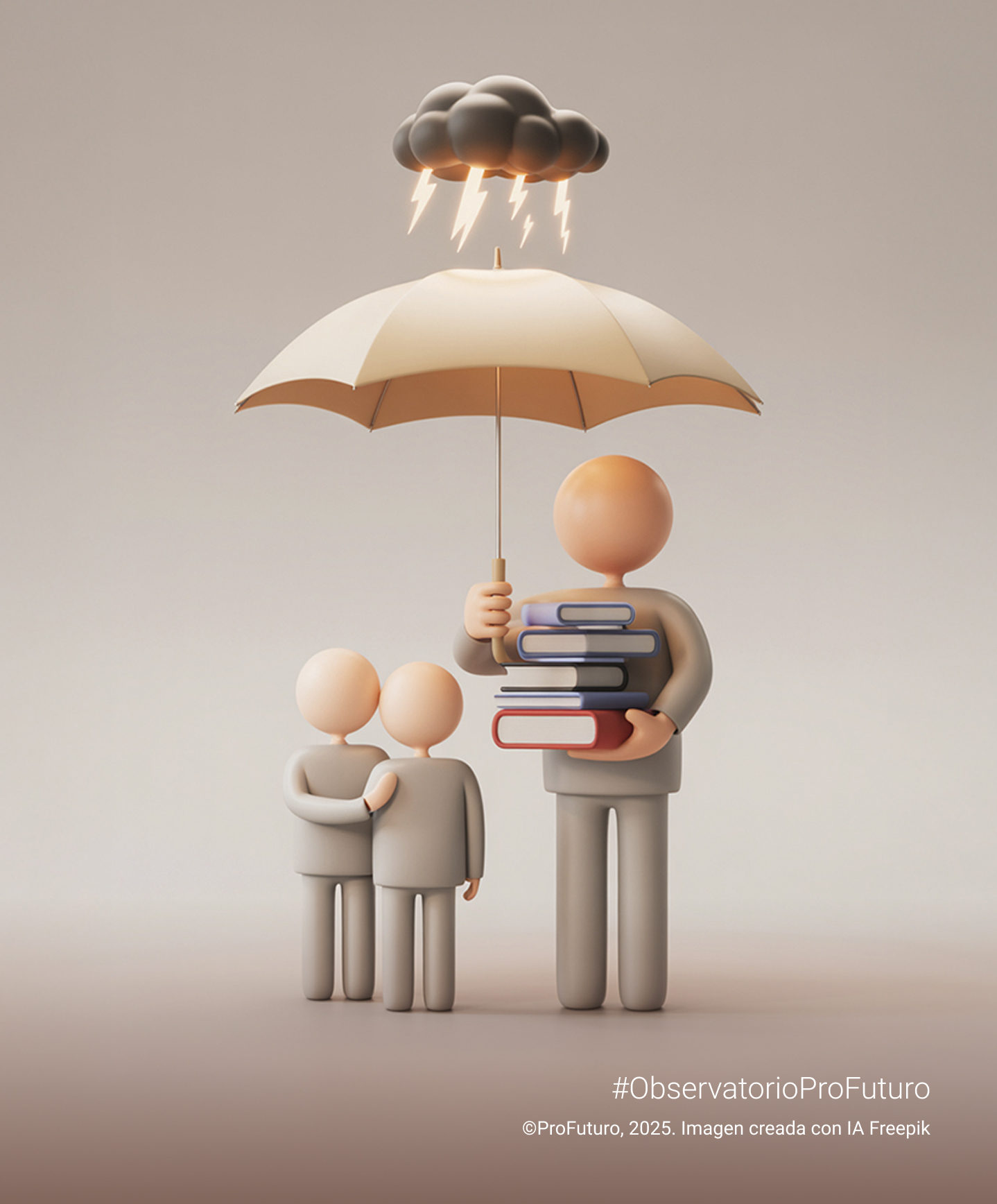Mathematics has always been a key element in the development of any civilisation: Greek, Roman, Mayan, Egyptian – why should ours be an exception? Without it, we would have no mobile phones, no scientific breakthroughs, no space missions, no Google searches; we cannot deny it. If we want to understand the world around us, we must necessarily turn to the dreaded and, more often than not, hated mathematics.
Now that it is clear that we increasingly live in a world dominated by algorithms, equations, knowledge graphs, prime numbers and Napierian logarithms, let’s think for a moment about the situation of mathematics teaching where, on one side of the ring, we find millions of bored and suffering students who cannot find the appeal of the subject, and on the other, thousands of frustrated and unmotivated teachers who fail to interest their students. In the middle are institutions, which observe, somewhat perplexed, as the students perform worse and worse in national and international tests and are at a loss when it comes to approving public initiatives and policies to remedy the situation.
In this post we will analyse the situation by trying to answer five key questions about the teaching and learning of mathematics.
Why is it important to learn mathematics today?
To be a competent citizen in the 21st century, you have to know how to use maths properly. According to PISA and UNESCO, strengthening mathematical sciences’ education is essential to address challenges in areas such as artificial intelligence, climate change, energy and sustainable development, as well as to improve the quality of life in the developed and developing world. In an interview with this Observatory, expert Carmen Salcedo expressed herself along the same lines: “If people know how to reason, detect patterns, identify risks, apply different problem-solving strategies, recognise false arguments and consider the impact of their decisions, we will have healthier, happier and fairer societies overall.”
Mathematicians also have no doubts: there’s an urgent need to teach maths to all the world’s children. As we’ve seen, it not only helps us to understand our environment better, it is also vital for resolving the problems and challenges posed by the world we will live in, ranging from global warming to social and political problems such as migration and health crises. Because, regardless of the profession we choose, maths will teach us to see the world upon the basis of its internal logic. To raise the right issues and be able to resolve them.
Why don’t students learn mathematics?

Korogocho (Nairobi, Kenya)
Mathematics has always been a key element in the development of any civilisation: Greek, Roman, Mayan, Egyptian – why should ours be an exception? Without it, we would have no mobile phones, no scientific breakthroughs, no space missions, no Google searches; we cannot deny it. If we want to understand the world around us, we must necessarily turn to the dreaded and, more often than not, hated mathematics.
Now that it is clear that we increasingly live in a world dominated by algorithms, equations, knowledge graphs, prime numbers and Napierian logarithms, let’s think for a moment about the situation of mathematics teaching where, on one side of the ring, we find millions of bored and suffering students who cannot find the appeal of the subject, and on the other, thousands of frustrated and unmotivated teachers who fail to interest their students. In the middle are institutions, which observe, somewhat perplexed, as the students perform worse and worse in national and international tests and are at a loss when it comes to approving public initiatives and policies to remedy the situation.
In this post we will analyse the situation by trying to answer five key questions about the teaching and learning of mathematics.
Why is it important to learn mathematics today?
To be a competent citizen in the 21st century, you have to know how to use maths properly. According to PISA and UNESCO, strengthening mathematical sciences’ education is essential to address challenges in areas such as artificial intelligence, climate change, energy and sustainable development, as well as to improve the quality of life in the developed and developing world. In an interview with this Observatory, expert Carmen Salcedo expressed herself along the same lines: “If people know how to reason, detect patterns, identify risks, apply different problem-solving strategies, recognise false arguments and consider the impact of their decisions, we will have healthier, happier and fairer societies overall.”
Mathematicians also have no doubts: there’s an urgent need to teach maths to all the world’s children. As we’ve seen, it not only helps us to understand our environment better, it is also vital for resolving the problems and challenges posed by the world we will live in, ranging from global warming to social and political problems such as migration and health crises. Because, regardless of the profession we choose, maths will teach us to see the world upon the basis of its internal logic. To raise the right issues and be able to resolve them.
Why don’t students learn mathematics?

It is clear that we cannot learn mathematics in the same way as it was learned over 100 years ago. As has happened in virtually all areas of life, technology has taken mathematics to another level. Why spend years teaching children to do things that computers can do in seconds?
In the same vein, Conrad Wolfram, physicist and mathematician from Cambridge University, also thinks that maths teaching is completely out of touch with today’s world and that the focus on doing calculations by hand ad nauseam, a task that takes up a large part of students’ time, no longer makes any sense in a world in which computers can do the same calculations much better and faster than us. Maths is much more than that. For example, knowing how to ask the right question. And being able to take any problem and transform it into a mathematical problem in order to resolve it (by means of a calculation) and, finally, bring it back to the real world once it’s been verified. Wolfram believes that children should focus on learning how to complete all these steps because the calculations are already done by the computer. He explains the above in this Ted talk that’s had almost 1,800,000 views.
Spanish mathematicians agree: in May 2021 Cemat (Spanish Committee for Mathematics) published a report sent to the Ministry of Education in which it argues that one of the biggest problems in the teaching of this subject is that there is a need for “less repetition and memorising” and “more logical reasoning”.
Other problems identified are the students’ own lack of confidence in their abilities, the belief that mathematical talent is something innate and which cannot be learned (either you have it or you don’t), lack of motivation, and as we will see below, lack of preparation of teachers.
Are teachers qualified to teach mathematics?

In recent years, teacher training in maths has been identified as one of the most important factors affecting student success or failure. Multiple reports attest to the fact that the teacher is the most important factor constraining a student’s learning achievements. If this is the case, and if we take into account the data from some studies that have analysed the performance of mathematics teachers in various regions of the world, it seems clear that teaching competence is not at its best at mathematics teaching. For example, in the report The challenge of STEM vocations, published by the Spanish Association for Digitalisation (DigitalES), teachers themselves answer the question in the title of this section. The answer is that they themselves do not consider themselves prepared. Thus, only 3% of the teachers surveyed are specialised in Mathematics, Technology or ICT. 86% of the teachers surveyed stated that they did not have the opportunity to specialise in any of these areas; 59% felt that they had not acquired sufficient knowledge during their studies and 72% believe that they did not learn how to teach this subject to students.
A study by the Inter-American Development Bank in Latin America and the Caribbean shows evidence that suggests that many teachers are not adequately prepared: in Peru, a study found uncorrected or poorly corrected errors; research carried out in Argentina, Colombia, Costa Rica, El Salvador, Guatemala, Peru, Mexico and Uruguay found extremely weak assessment practices; in Panama and Costa Rica, a comparative study involving class recordings revealed significant deficiencies in teachers with regard to both mathematics proficiency and teaching; in the Dominican Republic, an evaluation revealed that teachers exhibited extraordinary weaknesses in their knowledge of the content (only half of the fourth grade teachers in the provinces of Santiago and Santo Domingo knew that the common fraction 1/2 is greater than 1/3); and a survey in Argentina found that half of 153 teachers were unable to define the basic mathematical concepts that fourth graders have to learn.
Experts have also recently raised their voices to highlight that teacher training is responsible for the poor results obtained by students in maths. Many students arriving at education faculties have, in a way, been running away from mathematics since ESO and Bachillerato (compulsory secondary education and optional higher secondary education), and then they have to teach it. They lack mathematics training because they dropped the subject, and normally they are not sufficiently trained in mathematics in teacher training programmes.
Can technology help the mathematics teaching process?
We have already seen how technology has enhanced the role of mathematics in today’s society: today, data science and computing have elevated mathematics to a new level. We have also seen how this new conception of mathematics forces us to rethink the way we teach it.
However, can technology help us teach and learn mathematics? Absolutely. The tools offered by technology allow us to optimise the teaching and learning process, for example, according to the specific needs of each student, adapting the activities of each student according to the results of their work and emphasising, for example, their critical points. Of course, the teacher remains the key player, just as the doctor is still necessary despite the existence of scanners and clinical analyses. Technology will help you make better decisions when it comes to your students’ learning. This is essential in vulnerable environments where there are often no resources, either human or material, for children to learn the subject under the same conditions as their peers in more advantaged environments.
Can we change the way we teach mathematics?
We not only can; we must. Memorising formulas and tables and doing calculations until we are exhausted are by no means the only ways to learn mathematics. The world has changed and the teaching of mathematics must change too. For this reason, new methodologies have emerged in recent years which, where they have been applied, have proven to be effective. In the Observatory we have told you about some of them. For example, the ABN Method, which aims to make mathematical operations more comprehensible by changing the numbers into things so that they can be manipulated and understood. Or the Singapore Method, which teaches strategies that help students to visualise and conceptualise mathematics through a method in which students explore, discuss, analyse and reflect before the calculation. There is also Jump Math, a programme whose key is to get students to lose their fear of the subject, to gain confidence and to stop thinking that mathematics is only for the chosen few. ProFuturo has chosen the pedagogical keys of this programme to launch its teacher training course in mathematics. Neuroscience also provides us with an essential opportunity to learn this discipline; and it does so by focusing on how our brain learns and how what we learn helps us to improve the building processes of our mind. It is the basis of ProFuturo Mathematics, a tool developed by IteNlearning, which combines science and technology so that every student finds the best way to learn mathematics, regardless of external factors such as their socio-economic background.
Thus: Mathematics raised to a new level that demands a new way of teaching and learning it. Will we be up to the task?






